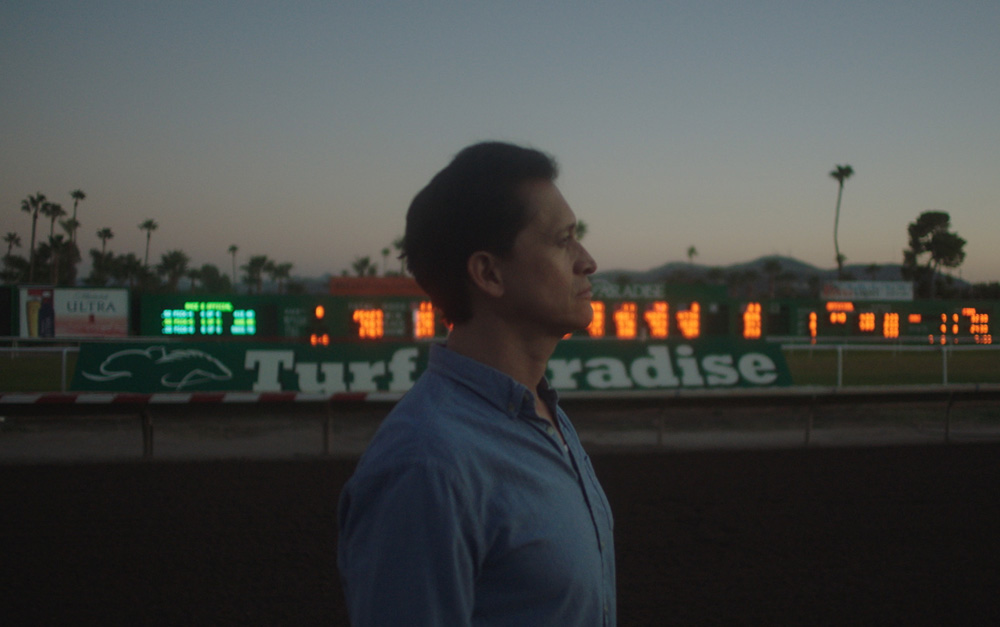Although there was never going to be a false note in whatever Clint Bentley wrote for “Jockey,” drawing on his experience being around racetracks as a kid watching his father ride horses, he quickly learned that to be completely honest in his directorial debut he wouldn’t be able to stick to a script. With his creative partner Greg Kwedar, who had helmed “Transpecos,” their previous collaboration as writers, he set about making a proof-of-concept short (“9 Races”) to see if what he had in mind was even possible, mixing in real jockeys and other track personnel in amongst a professional cast and crew to get a more authentic feel and the night before shooting a scene the next morning, the two lined up a number of jockeys to get in on the action. However, whatever promises were made on Friday had to be pulled back on Saturday when an impromptu race was put together at the last minute. Bentley could only wish them well as he saw one truck after another loading up to leave town and shot the screen without them, but it cracked open the notion that he was going to let the film lead him rather than the other way around.
It proves to be as good a place to start as any in “Jockey,” which tells of Jackson Silva (Clifton Collins Jr.), a veteran racer who appears to be reaching the end of the road, having injuries sustained over a long career finally catching up to him. Given Collins’ Jr.’s magnetic turn as the world-weary Silva, it would be enough to find the character at one crossroads, weighing whether to carry on as his body begins to give up on him, but Bentley and Kwedar intriguingly take him towards another when a new rider named Gabriel (Moises Arias) shows up at the track and claims to be his son, a development confusing enough as Silva wonders what he missed, but more so when he’s caught between mentoring the young man and having him as potential competition for his spot at the gates.
It isn’t just an unconventional family that forms on screen, which comes to include more trainer Ruth Wilkes (Molly Parker), but one off-screen that made the production as immersive and vividly lived-in as possible when Bentley brought in all the real regulars from True Paradise, the track the film shot at in Arizona from its Chaplain John Schumaker to the jockeys that compete there, to build the story inside of, going to remarkable lengths during a 20-day shoot to marry scripted scenes to the reality of the racing life. A film that boasts enormous heart and makes you feel it beating at the every turn, “Jockey” may depict a career that’s coming to a close but suggests a brilliant one ahead for Bentley and Kwedar, as well as becoming a high watermark in Collins Jr’s already illustrious filmography, and on the eve of its release following its debut at Sundance at the start of 2021, Bentley spoke about how it all came together, blending his own experience into the drama and continuing that process on set where a small, nimble crew could take full advantage of what the day would bring them.
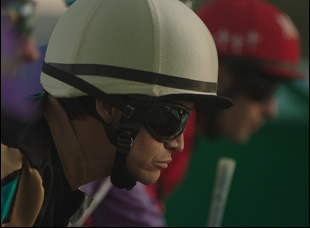
The initial idea was to make a horse racing movie because I’d had grown up in that world and then once it’s like, let’s put some legs on it and Greg and I started developing the story, it felt criminal that Cliff had not been given a leading role yet, so then it became a chicken and the egg thing of like okay, how do you do this very naturalistic movie about a world and almost give it a documentary feel, but then also give Clifton space to do everything he can do — being hard and gruff, but also be tender and thoughtful and sweet and tap dance and ride horses.
I understand on “Transpecos,” you, Greg and Clifton would have this ritual at the end of the night of going over what you had shot and perhaps veering off into directions that are exciting to you. Did something similar happen here?
Yeah, that became a ritual on “Transpecos” and really made Greg and I better writers and filmmakers and I can’t imagine not doing a film like that now, so we would get together every night after everybody ate their dinner and just go over what the next day was with whoever was acting opposite Clifton because he’s in every scene of the movie. Molly [Parker] was amazing at this and brought a lot to it and Moises did as well. It’s one of those things where sometimes you don’t do anything new. You just get to work out the questions that an actor will have of “Wait, why am I saying this line?” And you get to massage that line and make it a little better before the next day or just answer questions so that when you get to set, you’re not spending time asking and answering those questions. It would also provide the space where we’d get to a scene and we’re just like, “This doesn’t work anymore” based on where the movie is wanting to go at this point, so let’s just rewrite it and you could rewrite it with the actors right there in real time and let them say lines, so you could hear them. Our producer Nancy Schafer was just very kind and brilliant at whatever changes came her way and would pivot the production crew on a dime based on that.
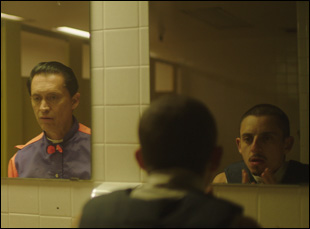
We looked at a lot of racetracks around the country, trying to find the right track and most of them had been bought by casinos and they had been renovated and so you’d pass it on a highway and it’d just look like a baseball stadium or a shopping mall. Turf Paradise had not been deeply renovated since the ‘70s or ‘80s and it just had such a texture to it. And once I got there, I met Vincent Francia, who’s the general manager there, and his first question was, “What’s your favorite movie?” And I was like, “Okay, this is the right person to make this with.”
There’s been a legend growing around this proof-of-concept video you shot for potential investors. How did it end up setting the tone for you?
It was good for a couple different reasons because I wanted to have a solid script and a solid story that we’re telling, but to work with first-time actors and fold actors into that world, I had not really done that before. I had done a lot of documentary work as a director, but then any short film I had done prior to that had been very scripted and very straightforward, so it became a question of how to figure out this tone and blend those two things together. Then it also [was a question of] can we do this safely? Going into a live working racetrack is not like shooting at a department store or something like that. You’ve got to be very thoughtful about it, so we figured that out and tonally, I was able to make a lot of mistakes in that first proof of concept that then I could learn from and hopefully do the right things in the feature.
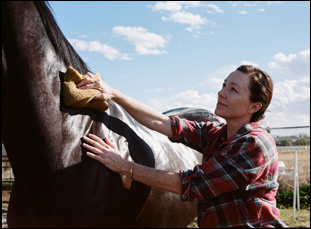
Yes, it was a lot of that and looking at what are they doing today, then scheduling our shoot around it, even to the point where there’s a scene [in which] Molly and Clifton’s characters are walking back at the end of a race and Molly’s giving him some advice and that’s a race [that just] ended. We popped the actors back out on the track and they walked back as everything’s unfolding behind them. Then we put our actors in the starting gates with other horses in there and our actors are just crouching there and pretending they’re on a horse. You couldn’t pay enough money to have that backdrop and again Nancy [Schafer] could pull rabbits out of hats and was really instrumental in me being able to take that approach as a director.
It seems your cinematographer Adolpho Veloso must’ve been quite flexible as well, though every shot appears incredibly composed. What was it like working with him?
Adolpho Veloso, the DP, is brilliant, and how I was talking earlier about blending these two things tonally, I didn’t totally figure that out. It was only when Adolpho came onboard and helped find this visual language that could merge those disparate qualities that it really gelled. At that point, I just trusted him the way you trust a good actor and if a good actor decides, “I’m going to walk over there right now,” you just let him and you see if it works. Usually, it does and Adolpho is so intuitive and has such an amazing eye that I would think, “Oh, we’ve got to move in here” and then he’d already be moving in, having thought about it a few seconds before me.
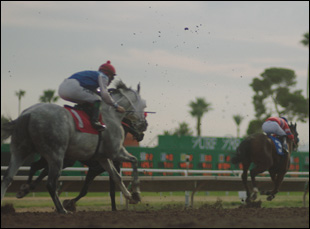
There’s so much magic that happens every day. It’s one of the benefits of shooting with a small crew is you have to be so regimented, but with a tiny crew, you can just pivot over and say, “Oh, there’s some geese flying over there towards the sunset. Let’s just pivot over and capture them.” The hardest thing to schedule for in a film is poetry and the wild horses was a big thing. I was just doing a little research on the internet before we went out to Phoenix to shoot and we just went out with a crew and Clifton and walked along the river for about a mile to look for these horses at sunset, hoping that we would find them. Literally at sunset, they just walked out of the woods onto the river and Clifton stood up there at this beautiful moment and we got it.
The scene where all the real jockeys are gathered to swap stories is pretty magical too, even though they’re describing all the occupational hazards. Was there any basis to that conversation or did you just let everybody loose to talk?
The initial impulse was to just try and get things across about this world that you would just sound terrible if you put it in dialogue, so once those jockeys became comfortable, I would just give them very minor cues of like, “Tell us about the first race you ever won” or “tell us about the first race you ever really got hurt in” and they would just go. They’re such natural storytellers, it was just something like comes very much out of that world that they say it better than we could ever write it. If you walk into any jock’s room or go to any bar today at any racetrack, you would hear that same stuff right now if you just sit around and listen.
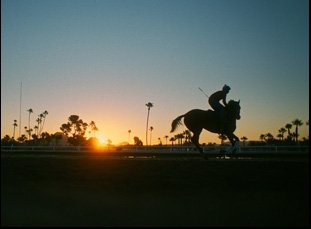
It was very difficult and took a long time. Parker Laramie, the editor, is the third storyteller on this along with Greg and I because he spent so much time and care really just exploring different things to really finally find that rhythm. And it was finding a silver lining in the pandemic [because] there was nowhere to send the movie for a year, so we really got that time to really let the movie find itself. A big thing we realized about a third of the way through the edit is we were messing with a scene that just wouldn’t work, trying to fit it in all different ways and Parker stepped back from it and he was like, “Oh, we just have to get out of this movie’s way.” And that became kind of the motto of the whole edit. Let the movie do what it wants to do and don’t overthink it.
What’s it like getting to the finish line now?
It’s incredible. Because of common wisdom, I tried to make this movie much bigger and with a bigger budget, but at the end of the day, really paring it down and making something I thought no one would see and just be this little personal film that at least would be the movie that I wanted to watch, it’s just so lovely that it’s connecting with so many people. I’m very grateful and thankful.
“Jockey” opens on December 29th in Los Angeles at the Laemmle Royal and New York at Film Forum and AMC Lincoln Square 13 before expanding across the country in the coming weeks.




